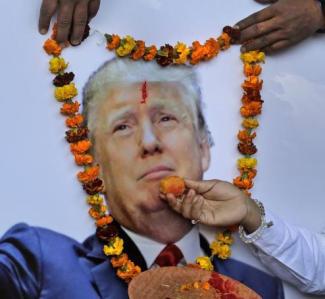Activism
Populists threaten human rights

Human rights are designed to protect people from government abuse and neglect, Roth reminds his readers. In his eyes, numerous populist leaders and movements all over the world do not care about these values. Claiming to speak for “the people”, they regard human rights as an obstacle to defending the nation from perceived threats and evils. The populists do not accept that everyone is entitled to rights, and encourage their supporters to believe that they need no protection from a populist government themselves.
Reasons Roth lists for the rise of populism in the west include people’s feelings of being left behind by technological change, the global economy and growing inequality. Terrorism increases the sense of fear. Some people are uneasy about society becoming more ethnically and religiously diverse. According to Roth, certain politicians abuse a climate of discontent to discredit human rights, arguing that these rights only serve terror suspects, asylum seekers and various minorities. They tend to scapegoat minorities moreover.
What populists and their followers neglect, in the eyes of Roth, is that rights by their nature do not admit an as-you-please-approach. Forsaking the rights of others means to jeopardise one’s own rights. He sees many western leaders losing confidence in human rights instead of taking action against the populist threat. He warns that the crisis will not simply blow over if democratic leaders bury their heads in the sand. Moreover, he criticises democratic leaders who echo populists phrases. Too many European leaders, he states, supported the call of Viktor Orbán, Hungary’s populist prime minister, to close Europe´s borders to refugees. The HRW leader similarly considers Donald Trump an example of vivid intolerance because of his track record of breaching basic principles of dignity, insulting woman, slandering minorities, attacking free media and stereotyping migrants and Muslims.
Roth sees similar populist trends in many non-western countries, including Russia, China, India, Turkey, Egypt and the Philippines. There is an international trend of “strongmen” cracking down on opposition voices, harassing civil-society groups and silencing media outlets. The author also mentions the devastating war crimes Syrian President Bashir al-Assad has committed by ruthlessly attacking civilians in opposition-held parts of the country, including Aleppo. He exposes the resentment several African leaders express for the International Criminal Court (ICC) as self-serving (see Darleen Seda in D+C/E+Z).
Roth demands a “vigorous reaffirmation and defence of the basic values”. In his eyes human rights organisations have to build alliances across communities and countries, bridging north-south divides and joining forces against autocrats. Media outlets should reveal the dangerous trends and assess the long-term impacts. They also should try to expose propaganda and manipulative “fake news”. Moreover, the HRW leader sees a responsibility of democratic governments to defend human rights, while the general public should insist on truth-based politics based on democratic values. Facts are powerful, according to him, which is why autocrats make such an effort to suppress inconvenient truths.
In another essay in the HRW document, Akshaya Kumar who is the organisation’s deputy UN director, proposes “naming and shaming” those who abuse human rights as an important tool for activists. She notes, however, that this strategy is useless when authoritarian leaders boast of their atrocities, as President Rodrigo Duterte of the Philippines does for example (see Alan Robles). Kumar wants human-rights activists to adapt new tactics, exposing those who enable abusers by providing funds, arms and other resources. Financiers and other enablers may depend more on appreciation by the international public than their clients, she argues.
Sabine Balk is a member of the editorial team of D+C/E+Z.
euz.editor@fs-medien.de
Link
HRW: World report 2017.
https://www.hrw.org/sites/default/files/world_report_download/wr2017-web.pdf








